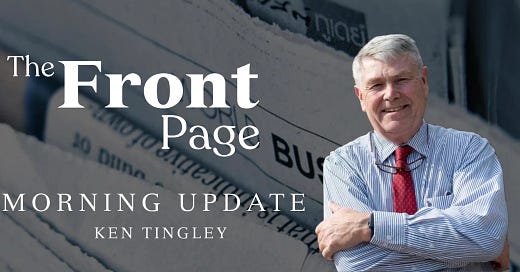`Aren't you retired?' People like Will Doolittle never retire
New documentary out on Indian boarding school scandal
Please consider supporting The Front Page with a paid subscription: HERE
How the sausage gets made in community journalism can be instructive.
It often starts with a single fact, a subtle observation or by asking a simple question. Good reporters and editors pull on those threads one at a time and the good ones are often one with a readership that is asking the exact same questions.
Such was the case with my colleague Will Doolittle recently.
Will, his wife Bella and their dog Ringo regularly stroll in downtown Glens Falls. After seeing a new apartment building over on Washington Street, Will wondered why such a large complex was allowed to be shoe-horned into such a small space.
It didn't fit.
Others thought the same thing. It was out of character for downtown.
Will wrote about it recently.
The other part of the community journalism equation is the importance of having people like Will who live and care about their communities. They never quite turn off their reporter radar.
They are always on the clock.
They are always asking "why" or "how come?"
Will read about developer Chris Patten's plans for a 60-unit development over on Glen Street and the elimination of a couple of grand old neighborhood houses.The story said that the building on Glen Street was empty.
Will decided to write about the new project. So while driving over to Glen Street to take a photo of the building, he saw two women carrying stuff out onto the front lawn for a yard sale.
Will pulled over and talked to the women.
One of the women told Will she had lived in the building for 10 years, always paid her rent on time and not been told about the proposed project. She told Will about her neighbor in the same building and Will called her, too.
Then Will pulled another thread.
He found the video of the most recent Planning Board meeting where Patten said the building was unoccupied and "condemnable."
Will knew that was not true because he had already visited the apartments where the two women lived. They were nice, comfortable. He posted photographic proof in his story.
He also went and checked the promised landscaping at Patten's apartment building on Union Street and there wasn't any.
What's next can only be explained as a sixth sense for reporters, something that doesn't sit right, a gnawing concern in the gut. Something didn't feel right.
So Will called the developer Patten. He felt he was confrontational from the start, "sneering at him" from the moment he answered the phone.
This is how Will remembered the conversation in his column this past Sunday:
I called him Saturday and asked how he knows the apartments are empty.
“I know the attorneys that own it,” he said.
He also toured the building, he said.
“I didn’t knock on every door. It’s pretty empty,” he said.
Two people live there, I said.
Maybe they just moved in, he said.
“They’ve lived there for years,” I said.
“That’s news to me,” he said.
Then his facade of minimal courtesy crumbled.
“You’re an asshole,” he said. “Go fuck yourself. Go hang out with —- (he mentioned the name of someone we both know who has been critical of him online). Fucking loser.”
Then he hung up.
But here is the part I love best. Here is the reason why columnists doing community journalism are needed more than ever. As the conversation continued, Patten finally said, "Aren't you retired?"
No, journalists like Will Doolittle never, ever really retire, they just stop getting a paycheck.
The story touched a nerve with The Front Page readership Sunday with one of our largest readerships ever.
The comments began to flow and many did not have good things to say about Patten or his building projects. They believe Glens Falls is better than that.
In conclusion, Will wrote: "The character of the developer should also be considered. Can he be trusted to do as he says? Do his methods reflect well on the city?"
Will planned on sending his column to those on the Planning Board and the Zoning Board of Appeals in hopes of making his little corner of the world better.
Shortly after hanging up on Will, Patten texted him this:
“People like you like to stir up trouble, not for the greater good of our city or its citizens, but rather to stir the pot and try to attract new subscribers to your website. You’re just another internet blogging troll."
Actually, it is just the opposite.
We need people like Will Doolittle more than ever.
New documentary
After writing about the tragedy of the United States' 100-year experiment to assimilate Native American children into white culture, I discovered there was a new documentary film out on the subject.
Like so many documentaries, the subject matter may be tough to watch, but the reality is that the history has been ignored for too long.
National Geographic, which bought the distribution rights to Sugarcane after seeing at the Sundance Film Festival, said the movie was "A stunning tribute to the resilience of Native people and their way of life, Sugarcane, the debut feature documentary from Julian Brave NoiseCat and Emily Kassie, is an epic cinematic portrait of a community during a moment of international reckoning."
The documentary brings us up to date with the 2021 discovery of unmarked graves at an Indian residential school in British Columbia. Set as the investigations continues to unfold, the film documents the reaction in the Indian community and the trauma the schools inflicted over generations.
It shouldn't be missed.
How we have changed
I've been reading historian Doris Kearns Goodwin's latest book An Unfinished Love Story about her observations of President Lyndon Johnson's work during the 1960s.
Her late husband, Dick Goodwin, worked as speech writer and aide for both President John Kennedy and President Johnson while Kearns worked for President Johnson.
In reviewing some of LBJ's most significant speeches, I was struck by the spirit of idealism, that anything was possible during those turbulent times.
What eventually became known as "The Great Society" speech at the University of Michigan was written by her husband, Dick Goodwin.
Johnson goal for "The Great Society" was to address the challenges of "city, countryside and classrooms."
His vision was all inclusive.
He proposed "a place where men are more concerned with the quality of their goals than the quantity of their goods."
As he looked out at the University of Michigan graduates, he issued them a challenge:
"For better or worse, your generations has been appointed by history to deal with those problems and to lead America toward a new age. You have the chance never before afforded to any people in any age. You can help build a society where the demands of morality and the needs of the spirit can be realized in the life of the Nation."
It was a reminder of how far we have fallen as a country and what we need today.
LBJ challenged the students to "help build a society where the demands of morality and the needs of the spirit can be realized."
Some 80,000 filled the football stadium that day and rose to their feet as Johnson finished.
"Will you join in the battle to give every citizen the full equality which God enjoins and the law requires. whatever his belief or race, or the color of his skin?" Johnson asked.
"Will you join in the battle to give every citizen an escape from the crushing weight of poverty?"
Johnson's call in "The Great Society" speech was for federal and state aid for education for every child from preschool go college; the development of medical care program for the elderly and the underprivileged (Medicare and Medicaid); a national effort to make the city a better pace live; an environmental program to end the poisoning of the rivers and air; a national foundation to support the arts; and new laws to eliminate barriers to voting.
That's where it all began and it makes you wonder why so many want to roll back those initiatives.
Great interview
I don't often listen to podcasts, but when I do, I often turn to The Daily on the New York Times.
Last week, there was an interview with Republican Sen. James Lankford.
The Oklahoma senator was in the news earlier this year when he brokered a bipartisan deal to address the southern border crisis that, essentially, gave Republicans everything they had asked for to secure the border.
But then candidate Donald Trump stepped in and killed the deal. He believing solving the problem for the good of the country might cost him votes.
I did not know a lot about Lankford. He has only been a U.S. senator since 2015 and from 1996 to 2009 he was the president of the Falls Creek Baptist Conference Center. He left that position to serve two terms in Congress, then became a senator.
What struck me about Lankford was his thoughtful approach to the immigration issue and his willingness to work in a bipartisan way to get the job done.
There was no lying, no need for a fact check and no name calling.
He sounded like the type of senator we all used to expect in Congress.
He didn't duck the tough questions and for a few minutes, he gave me hope for the future.
Ken Tingley spent more than four decades working in small community newspapers in upstate New York. Since retirement in 2020 he has written three books and is currently adapting his second book "The Last American Newspaper" into a play. He currently lives in Queensbury, N.Y.







Sounds like Mr Patten has something to hide.
Go, Will! Go, Ken! Keep on telling the story of this abominable man. He should be blocked from any further development opportunities in Glens Falls.